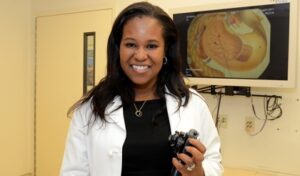
Folasade P. May, MD, PhD, MPhil, is a gastroenterologist and researcher with the VA Greater Los Angeles Healthcare System VA and UCLA. VA Photo by Jeffery D. Russell
LOS ANGELES — Colorectal cancer is one of the most preventable and treatable of cancers, despite being one of the most prevalent, ranking as the second-leading cause of cancer death in adults. This makes what gastroenterologist and health services researcher Folasade May, MD, PhD, MPhil, is doing at the VA and at the May Laboratory at UCLA so incredibly important.
With her colleagues, she is working to better understand the obstacles keeping so many from receiving appropriate screenings and treatment, and then finding ways to remove those barriers and save lives.
“I’ve always been interested in patient care and disparities and why it is certain populations fare worse with health outcomes than others,” May explained.
While at Harvard Medical School, May spent several months learning from senior physicians at the West Roxbury VAMC. It was there that she became fascinated with the intersection between health and preventive care, especially as it applied to veterans.
“It’s not a secret that a large majority of our patients are men. Male health preventative care utilization is very low,” she said. “A lot of male veterans are only seeing doctors when something is very wrong or when they have a chronic medical condition. Men also disproportionately die from cancers.”
As a gastroenterologist, the No. 1 public health challenge that she faces is the prevention of colorectal cancer. Not only is it the second-leading cause of death, it is starting to be seen in younger and younger patients, requiring new generations to screen for colorectal cancer years, if not decades, earlier than their parents.
“Why is it affecting younger people? That’s the golden question right now, when you look at colorectal cancer prevention and control.”
While that might be the main question for the research community as a whole, May’s golden question also is, how do you get people who don’t usually utilize preventive care to do so, especially those populations who are disproportionately affected by the disease.
“I had gone through medical school and internal medicine training, and I had never been taught that Black Americans were more likely to get and die from colorectal cancer,” May declared. “Being a Black American, I asked why wasn’t there more attention paid to that problem and to solutions?”
One of the reasons Black Americans are at higher risk for colorectal cancer is because they have a high prevalence for the risk factors: a diet heavy in processed food and red meat, intake of alcohol and tobacco and higher rates of obesity and diabetes, according to research.
“Black Americans are also less likely to participate in screening, which is a life-saver,” May said. “There are hundreds of cancers, but very few that every medical community agrees we should try to catch early with proven medical technology. Colorectal is the only one that affects men and women that we recommend screening for at a certain age.”
In 2011, May came to UCLA to begin her gastroenterology fellowship and earn a PhD in health policy and management. Part of the UCLA Specialty Training and Advanced Research (STAR) program, she was already conducting impactful research on screening disparities at VA.
“When I started doing the colorectal disparities work, no one else was doing it,” May explained. “VA had a high rate of screening, but not one was doing it by race and ethnicity.”
May helped show that Black veterans were being screened at lower rates, which led to more attention paid by VA to that population.
“Through these large introductory studies, we were able to point VA to where we can have improvement,” she explained. “Years later, that’s resulted in dedicated screening programs. And now we always look at race and ethnicity. … Right now, we don’t see Black and white differences in screening at VA.”
Upon completion of her fellowship in 2015, May joined the digestive diseases faculty at UCLA, splitting her time between the university and treating veterans as part of the VA Greater Los Angeles Health Care System. She also was asked to continue her research, but on a larger scale.
UCLA partnered with May to create the May Laboratory—a health services research and quality improvement program that focuses on patients with digestive diseases. Led by May, the team includes biostatisticians, clinical and research fellows, residents, and students—all focusing on better understanding health disparities and removing barriers to care.
While screenings have improved at VA, there still are disparities in the care that comes after. For example, Black veterans are less likely to get timely follow-up care—diagnostic tests and cancer treatments—if they have an abnormal screening test.
These gaps also can extend to veterans who do at-home screening. In response to May’s earlier research, VA launched a program that mailed noninvasive cancer-screening tests to veterans, thus improving the screening equity part of the equation.
However, if those tests come back abnormal, the patient will need to come in for a traditional colonoscopy.
“VA has a very high screening rate, but we need to do better with that second step,” May noted.
Conversely, researchers at the May Laboratory are examining whether some veterans no longer need to worry about being screened.
“We have a slew of studies looking at older veterans,” May explained. “How long do you need to screen older veterans for? Will they be getting colorectal cancer in their 80s and 90s? Or is there a point where it’s safe to stop screening?”
The lab also is doing work embedded in communities in and around Los Angeles—something that May is excited for VA to participate more in the future.
“For Black and Latino veterans–what can we do near their homes, where they live?” she asked. “What can we do about raising awareness about screening? And then getting them into VA regularly?”
